


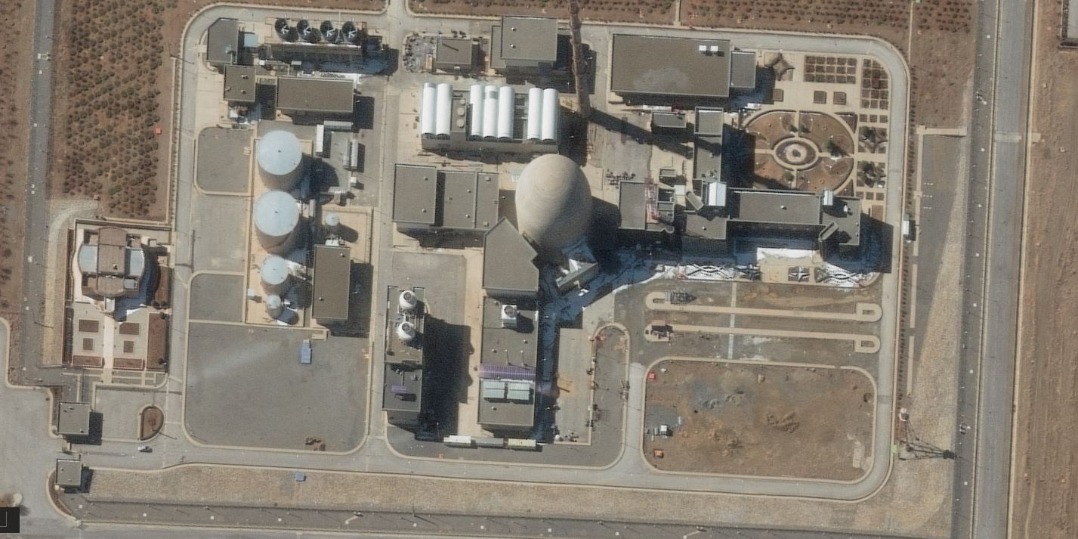
Iranian nuclear facilities may have largely survived attack, initial report says.
UN chief welcomes Trump's announcement of Israel-Iran ceasefire and urges Israel and Iran to fully respect the ceasefire and to stop fighting.
TEHRAN -- The death toll from Israeli attacks on Iran between June 13 and 24 has reached 1,060, head of Iran's Foundation of Martyrs and Veterans Affairs Saeed Ohadi said Monday.
In a televised interview with state-run IRIB TV, Ohadi said the number could further rise given the seriously injured and the unidentified bodies.
Israel launched a series of major airstrikes on June 13 targeting nuclear and military sites across Iran, killing senior commanders, nuclear scientists, and civilians, and injuring many others, according to Iranian authorities.
Iran retaliated with multiple waves of missile and drone attacks on Israeli territory, causing casualties and damage.
A ceasefire between the two countries was reached on June 24, ending 12 days of fighting.
TEHRAN -- Iranian Foreign Minister Seyed Abbas Araghchi held a phone conversation with European Union foreign policy chief Kaja Kallas on Tuesday, during which he condemned what he described as "military aggression" by Israel and the United States against Iran, according to a statement from the Iranian Foreign Ministry.
In the phone call, Araghchi said the Iranian people decisively defended their country's territorial integrity and national sovereignty against the Israeli-US "aggression," which he said had severely undermined diplomacy, the Non-Proliferation Treaty, and UN Security Council Resolution 2231 -- the resolution endorsing the 2015 Iran nuclear deal.
He criticized certain European countries and International Atomic Energy Agency (IAEA) Director General Rafael Grossi for their positions, particularly during the recent adoption of an anti-Iran resolution by the IAEA Board of Governors.
Araghchi warned that the continuation of that "destructive" approach by certain European countries would further complicate the situation and obstruct diplomatic efforts toward de-escalation.
Kallas, for her part, stressed that there was no evidence indicating that the development of Iran's atomic program was for making nuclear weapons.
She highlighted the necessity to find a diplomatic solution to resolve Iran's nuclear issue and support ongoing efforts to de-escalate tension and ensure stability in the West Asia region.
On June 13, Israel launched major airstrikes on several areas in Iran, including nuclear and military sites, killing senior commanders, nuclear scientists, and civilians. Iran responded with multiple waves of missile and drone attacks on Israel.
On June 22, US forces bombed three Iranian nuclear facilities. In retaliation, Iran struck the US Al Udeid Air Base in Qatar.
After 12 days of fighting, a ceasefire between Iran and Israel was reached on June 24.
Israel plotted to attack a high-level meeting of Iranian officials, including heads of government, and later targeted Supreme Leader Ayatollah Ali Khamenei, a senior advisor to Khamenei has claimed, saying the Israeli plan was foiled.
"The enemy's plan in this war was to target IRGC commanders and key national centers simultaneously," Ali Larijani said in a televised interview with Press TV of Iran on Sunday. "They believed they could pressure certain officials into abandoning the establishment through threats."
Earlier, Israeli Defense Minister Israel Katz said in a series of interviews aired on June 26 that Israel sought to eliminate Iran's supreme leader during its 12-day conflict with Iran, but that the opportunity never presented itself.
"If he had been in our sights, we would have taken him out," Katz told Channel 13, adding that Israel "searched a lot" for Khamenei but that the operational opportunity did not arise, The Times of Israel reported.
Larijani, who served as Parliament speaker between 2008 and 2020, said Israel attempted during the conflict to intimidate some Iranian officials, including politicians, military officers, and security personnel.
"On Friday (June 13), they contacted me and gave me 12 hours to leave Iran or get out of Tehran – or else, they said, I'd meet the same fate as martyrs like (Chief of Staff of Iran's Armed Forces Major General Mohammad Hossein) Bagheri and (commander of Iran's top military headquarters Major General Gholam-Ali) Rashid," he was quoted as saying by Press TV.
He said he "recognized from the caller ID where it was coming from and gave them the response they deserved", he was also cited by the Iran International media outlet.
The Israeli regime launched its "unprovoked aggression on the Islamic Republic" on June 13, with, he said, United States backing, assassinating several top-ranking military commanders, about 10 atomic energy scientists, and civilians, including women and children. Iran held a state burial for those who died on June 28.
Pointing to Iran's retaliation against the US attacks on Iran's three nuclear sites, Larijani said, "out of 14 Iranian missiles, six struck the American base (in Qatar) – and they hit hard, each carrying a 400 kg warhead."
In his remarks, the Iranian senior official said the US engaged in five rounds of indirect talks with Iran prior to the aggression, solely to mislead Iran, while Israel carried out the strikes in complete coordination with Washington.
"The US used talks as a capacity for deception and military aggression," he said.
The Israeli surprise attacks on Iran came just two days before the sixth round of indirect talks, which were scheduled to take place in Muscat on June 15.
Among Israel's targets for assassination was Ali Shamkhani, a key adviser to Iran's supreme leader, who stunned observers by making his first public appearance at the state funeral on June 28, after Israeli media and officials declared him dead in the wake of the unprecedented airstrikes on Iran.
Shamkhani's home was blasted by Israeli strikes while he and his relatives were resting.
"At first, I thought it was an earthquake. I was trapped under the rubble for three hours until I heard the sound of a car. At that moment, I understood that Israel had targeted me," he stated, according to L'Orient Today. "I was alert from the first moment and tried to find an exit. I was not afraid."
Shamkhani also revealed that his wife and son were injured in the attack, adding that he was unable to speak clearly at that moment due to the pressure from the strike and the shock of the situation. He acknowledged being injured, but the Israelis had falsely claimed that his legs had been amputated.
Shamkhani also indicated that he knew why the Israelis had targeted him but could not reveal it at this stage.
"I had given them a tough lesson," he stated.
Cui Haipei in Dubai, UAE contributed to this report.
TEHRAN --Iran's Foreign Ministry on Monday accused the United States of "betraying" diplomacy, claiming Washington's alleged role in recent Israeli military strikes threatens the future of indirect nuclear negotiations.
At a weekly press conference in Tehran, ministry spokesman Esmaeil Baghaei said the US had encouraged an Israeli attack that occurred just two days before a planned sixth round of talks between Iran and the US brokered by Oman.
Baghaei said that the US betrayed a diplomatic process, adding that "it really cannot be expected that this fact does not affect the continuation of the negotiations."
He also rejected US allegations that Iran was not serious about the talks, calling them "baseless" and a pretext to justify the strikes.
The nuclear negotiations, which have proceeded through five indirect rounds since April, were suspended after Israeli airstrikes targeted Tehran and other locations. On June 22, the US Air Force bombed three Iranian nuclear facilities. In retaliation, Iran launched a strike on the Al Udeid Air Base in Qatar, which hosts US forces.
A ceasefire between Iran and Israel was reached on June 24, ending 12 days of hostilities.
Baghaei also criticized Germany and France for backing Israel, singling out remarks by German Chancellor Friedrich Merz, who described Israel's actions as "the dirty work Israel is doing for all of us." Baghaei said the statement would bring "historic and eternal shame upon Germany."
TEHRAN -- The death toll from Israeli attacks on Iran between June 13 and 24 has climbed to 935, including 38 children and 132 women, Iran's official news agency IRNA reported on Monday.
Citing figures from the Iranian Legal Medicine Organization, judiciary spokesman Asghar Jahangir said at a press conference in Tehran that some of the women killed were pregnant.
Israel launched a series of major airstrikes on June 13 targeting nuclear and military sites across Iran, killing senior commanders, nuclear scientists, and civilians, and injuring many others, according to Iranian authorities.
Iran retaliated with multiple waves of missile and drone attacks on Israeli territory, causing casualties and damage.
A ceasefire between the two countries was reached on June 24, ending 12 days of fighting.
TEHRAN -- Iranian Foreign Minister Seyed Abbas Araghchi said early Saturday that if US President Donald Trump is sincere about seeking to reach an agreement with Tehran, he should put aside his "disrespectful tone" towards the Iranian supreme leader.
He made the remarks in a post on social media platform X while condemning the U.S. president's several instances of using "disrespectful" language when speaking about Iran's Supreme Leader Ali Khamenei.
"If President Trump is genuine about wanting a deal, he should put aside the disrespectful and unacceptable tone towards Iran's Supreme Leader ... and stop hurting his millions of heartfelt followers," he said, noting that "good will begets good will, and respect begets respect."
"The complexity and tenacity of Iranians is famously known in our magnificent carpets, woven through countless hours of hard work and patience," he stressed, adding that however, "as a people, our basic premise is very simple and straightforward: we know our worth, value our independence, and never allow anyone else to decide our destiny."
Facilitated by Oman, Iranian and US delegations had held five rounds of indirect talks since April on Tehran's nuclear program and the lifting of US sanctions.
However, the negotiations were halted earlier this month as Israel launched airstrikes on Tehran and other areas.
TEHRAN -- Iran on Saturday reopened its airspace in central and western areas to passing international flights, the Roads and Urban Development Ministry announced.
The decision was made following the approval of the Civil Aviation Organization (CAO) of Iran and completion of security and safety assessments by the relevant authorities, ministry spokesman Majid Akhavan said in a statement.
He added the country had earlier reopened its eastern airspace to domestic, international, and passing flights, stressing that no flight would land in or take off from Iran's airports in the northern, southern and western parts.
In another statement, the CAO said the country's airspace in the northern, southern, and western parts would remain closed until 14:00 local time (1030 GMT) on Sunday.
Iran closed its airspace on June 13 following Israeli airstrikes on Tehran and other areas. Following a 12-day aerial conflict, a ceasefire between the two sides was achieved on Tuesday.
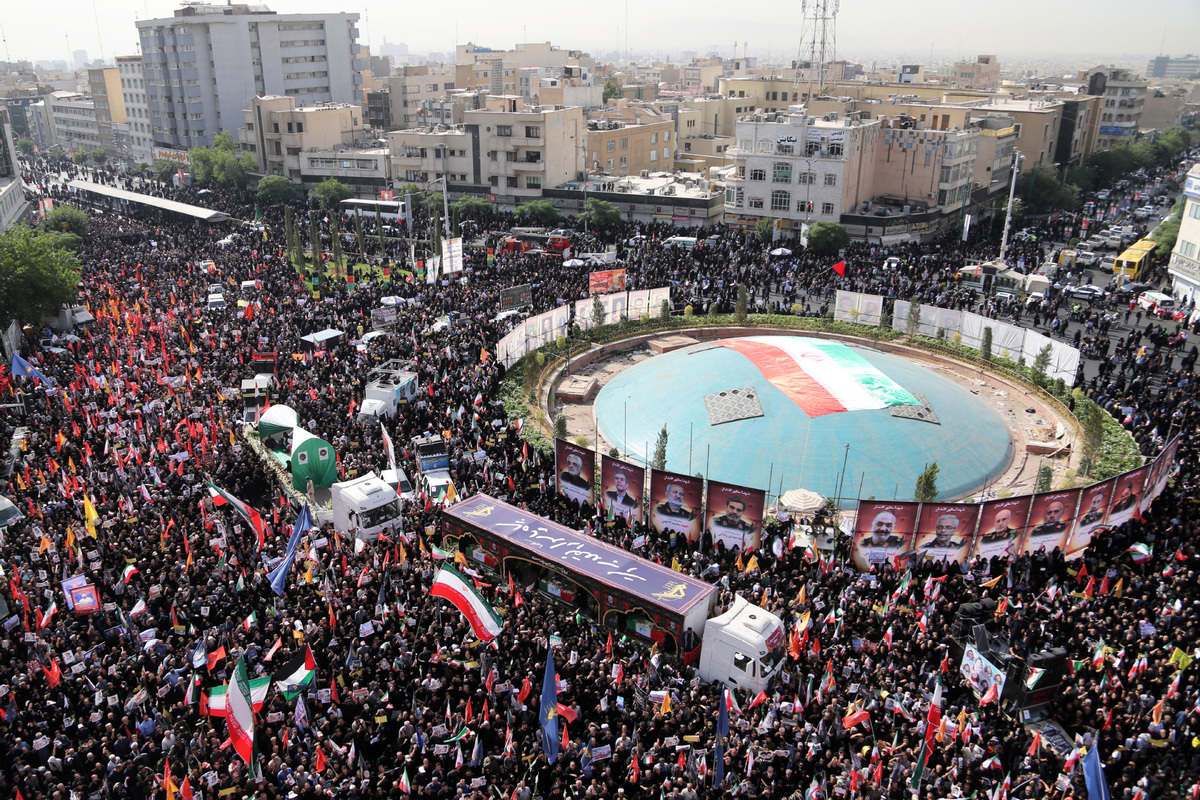
TEHRAN -- Iran on Saturday held a state funeral for the military commanders and nuclear scientists killed during a 12-day conflict with Israel.
The ceremony was attended by the families of those killed in the attacks as well as high-ranking Iranian officials and military commanders, including President Masoud Pezeshkian, Judiciary Chief Gholamhossein Mohseni-Ejei, Parliament Speaker Mohammad Bagher Ghalibaf, Foreign Minister Seyed Abbas Araghchi and senior advisor to Iran's supreme leader, Ali Shamkhani, who was severely injured in the Israeli airstrikes on Tehran.
On June 13, Israel launched major airstrikes on different areas in Iran, including nuclear and military sites, killing several senior commanders, nuclear scientists and civilians. Iran responded by launching several waves of missile and drone attacks on Israel.
Following the 12-day war, a ceasefire between Iran and Israel was achieved on Tuesday.
The mourners waved Iran's flags while chanting slogans against Israel and the United States. They carried pictures of the "martyred" commanders and nuclear scientists, including Chief Commander of the Islamic Revolution Guards Corps (IRGC) Hossein Salami, Chief of Staff of the Iranian Armed Forces Mohammad Bagheri, Chief Commander of the IRGC's Aerospace Division Amir Ali Hajizadeh and chief commander of the Khatam al-Anbiya Central Headquarters and his successor, Gholam Ali Rashid and Ali Shadmani respectively.
Iran's Interior Minister Eskandar Momeni said at the ceremony that the United States and Israel proved that they failed to honor any of their commitments.
He emphasized that the Iranian armed forces were highly vigilant to give a decisive response to any "malicious action" or breach of promises by the "enemy."
The burial ceremonies are scheduled to be held on Sunday.
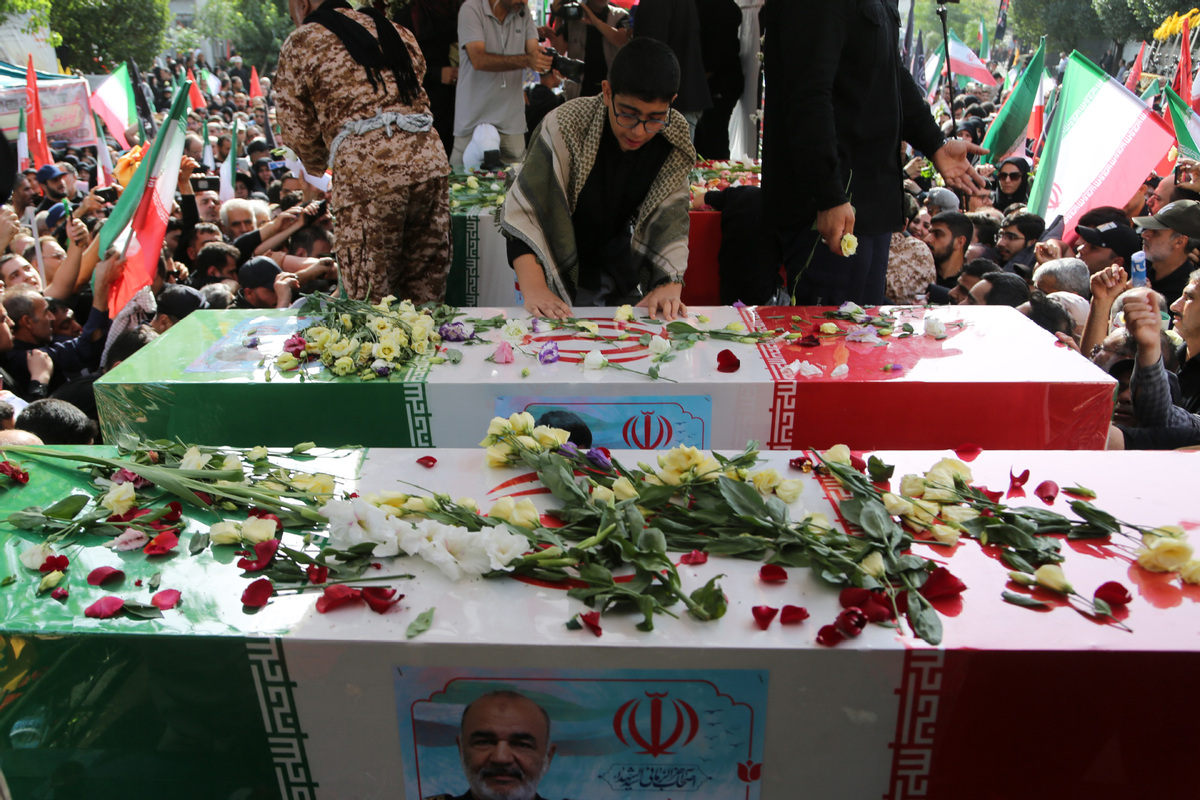
TEHRAN -- Iran announced on Thursday the closure of its northern, southern, and western airspace will remain in effect until Friday afternoon, state-run IRIB news agency reported.
"In view of the reopening of Iran's eastern airspace to domestic and international flights, the country's airspace in the northern, southern and western parts will remain closed until 14:00 local time on Friday (1030 GMT)," IRIB quoted Spokesman of Iran's Roads and Urban Development Ministry Majid Akhavan as saying.
The ministry had announced on Wednesday night the reopening of its eastern airspace, saying the move aimed to gradually restore air traffic to pre-conflict levels.
Iran closed its airspace on June 13 following Israeli airstrikes on Tehran and other areas. Following a 12-day war, a ceasefire between the two sides was achieved on Tuesday.
TEHRAN -- Iran's Constitutional Council on Thursday approved a plan, already ratified by the parliament, to suspend the country's cooperation with the United Nations nuclear watchdog.
The plan, which calls on the Iranian government to halt cooperation with the International Atomic Energy Agency (IAEA), was reviewed by the council and found to be in line with Iran's religious regulations, laws, and constitution, council spokesperson Hadi Tahan Nazif said in an interview with state-run IRIB TV on Thursday.
"Given the violation of Iran's national sovereignty by the United States and Israel, their attacks on its territorial integrity as well as peaceful nuclear facilities and jeopardizing of the national interests, the Iranian administration is duty-bound to suspend any cooperation with the IAEA by the time full respect is not guaranteed for the country's national sovereignty and territorial integrity, and security is not ensured for Iranian nuclear centers and scientists," said Tahan Nazif.
Tahan Nazif added that the plan also emphasizes safeguarding Iran's inherent nuclear rights, including the enrichment of uranium on its own soil.
In Iran, the Constitutional Council wields considerable authority over legislation passed by the parliament. It reviews all bills to ensure compliance with with Islamic law and the constitution, and holds veto power over legislation. Following the council's approval, legislations become laws.
According to the ICANA news agency, which is affiliated with Iran's legislative body, the plan was passed during an open session of parliament in Tehran on Wednesday, with 221 votes in favor and one abstention.
On June 13, Israel launched major airstrikes on different areas in Iran, including nuclear and military sites, killing several senior commanders, nuclear scientists and many civilians. Iran responded by launching several waves of missile and drone attacks on Israel, inflicting casualties and damage.
On Saturday, the US Air Force bombed three Iranian nuclear sites of Fordow, Natanz and Isfahan. In retaliation, Iran on Monday struck the US Al Udeid Air Base in Qatar with missiles.
Following the 12-day war, a ceasefire between Iran and Israel was achieved on Tuesday.
TEHRAN -- Iranian Supreme Leader Ali Khamenei said on Thursday the United States gained nothing from the war against Iran and instead received a "harsh slap" in the face.
He made the remarks in a video message broadcast by state-run IRIB TV while congratulating the Iranian nation on its "victory" in the war with Israel and the United States.
"Despite all its propaganda and claims, Israel was almost knocked down and crushed under Iran's blows," said Khamenei.
He added that the Iranian missiles and other weapons managed to pass through Israel's "advanced multi-layered defense" and raze to the ground many of Israel's urban and military areas.
Khamenei said Israel should know that any aggression against Iran would be heavily costly for it.
He added the United States entered the war to rescue Israel, "but accomplished nothing from this war."
He noted that the United States exaggerated its achievements in the war because they failed to achieve their objective and needed that to cover up the truth, emphasizing that "here again, the Islamic Republic of Iran achieved victory and responded by giving the United States a harsh slap in the face."
Khamenei said Iran attacked US Al Udeid Air Base in Qatar, "which is among the US important bases in the West Asia region," and inflicted damages, stressing that some sought to downplay it and said nothing had happened.
On June 13, Israel launched major airstrikes on different areas in Iran, including nuclear and military sites, killing several senior commanders, nuclear scientists and many civilians. Iran responded by launching several waves of missile and drone attacks on Israel, inflicting casualties and damage.
On Saturday, the US Air Force bombed three Iranian nuclear sites of Fordow, Natanz and Isfahan. In retaliation, Iran on Monday struck the US Al Udeid Air Base in Qatar with missiles.
Following the 12-day war, a ceasefire between Iran and Israel was achieved on Tuesday.
Foad Izadi, associate professor at the University of Tehran's Faculty of World Studies, told China Daily on June 25 that life in Tehran and other major Iranian cities is returning to normal. He warned that if the US and Israel succeed in carrying out unprovoked attacks without consequences, which is against the international law, they could attempt to repeat such actions against other countries.
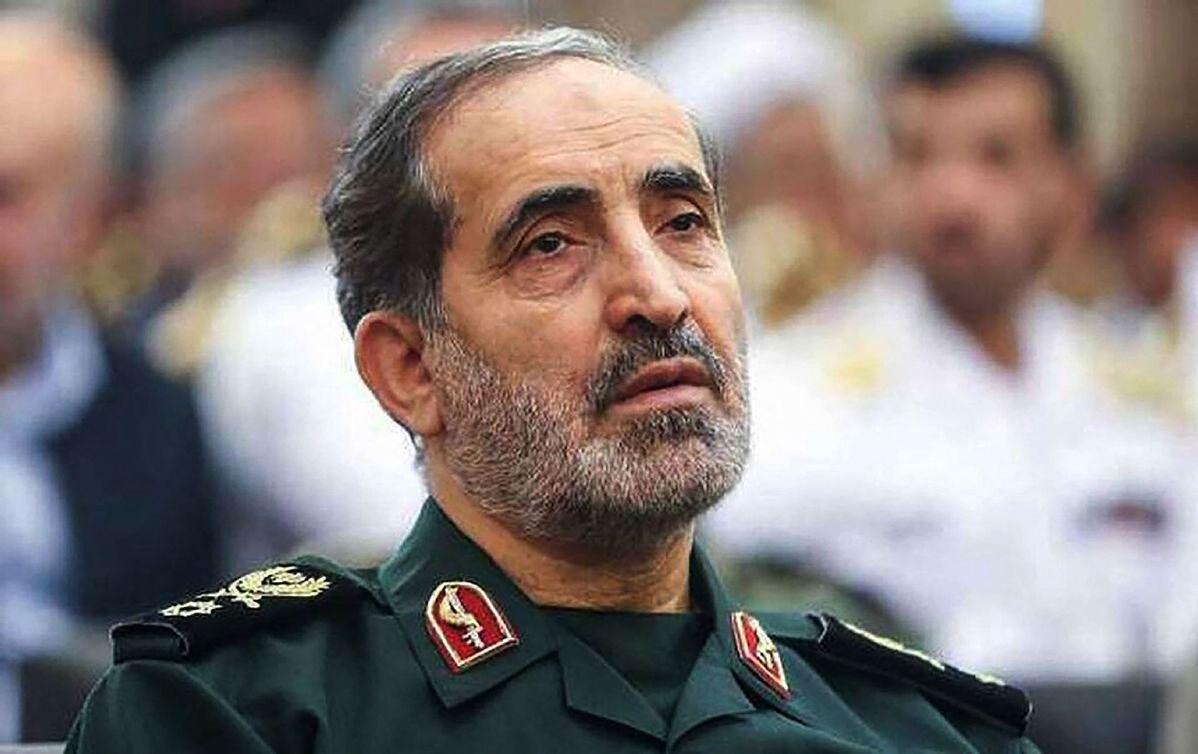
TEHRAN -- Iran's Khatam al-Anbiya Central Headquarters said on Wednesday its Chief Commander Ali Shadmani, who was injured in an Israeli airstrike, has succumbed to his wounds.
Shadmani, who had recently replaced Gholam Ali Rashid at the helm of the military body, was severely wounded in an Israeli attack on Iran last week, according to the semi-official Tasnim news agency.
The Israeli military claimed last week to have killed Shadmani in the overnight airstrike on a command center in central Tehran.
On June 13, Israel launched major airstrikes on different areas in Iran, including nuclear and military sites, killing several senior commanders, nuclear scientists and many civilians. Iran responded by launching several waves of missile and drone attacks on Israel, inflicting casualties and heavy damages.
A ceasefire was declared between Iran and Israel on Tuesday.
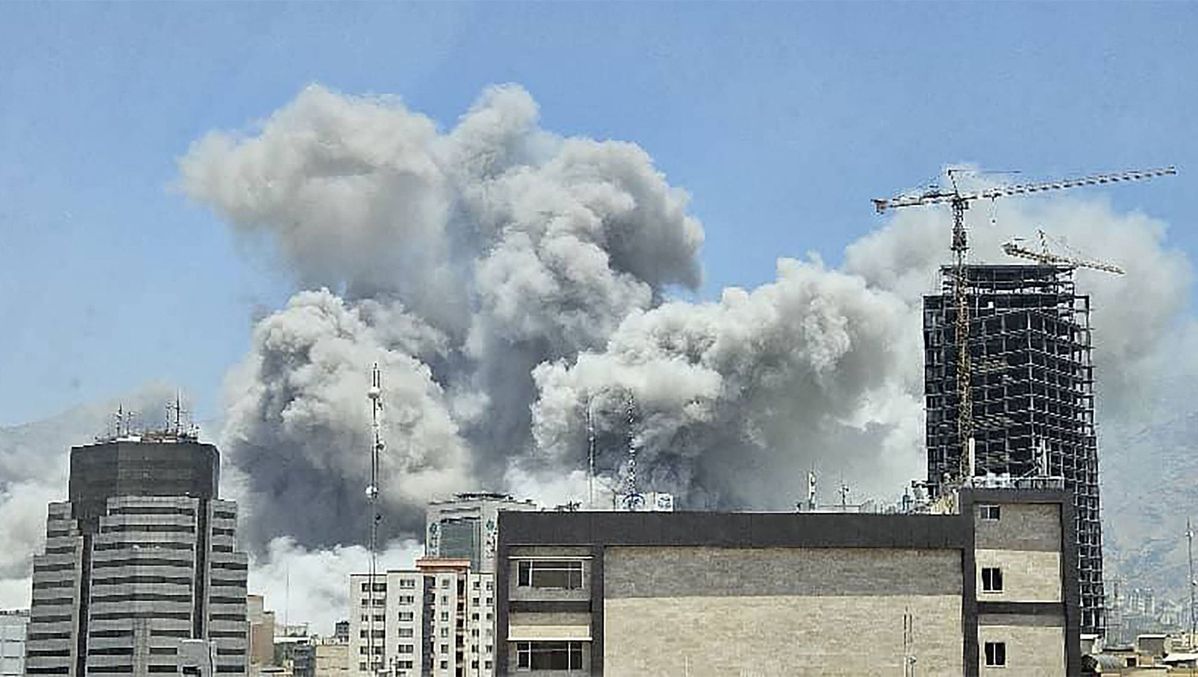
JERUSALEM -- David Barnea, chief of Israel's Mossad intelligence agency, said the organization will continue its activities in Iran, according to a video released by Mossad on Wednesday.
The video shows Barnea addressing operatives at the agency's operational headquarters on Tuesday, just hours after a ceasefire between Israel and Iran took effect.
"We will continue to keep a close eye on all of Iran's projects that we already know in the most in-depth way. We will be there as we have been there until now," he said.
He noted that, "With accurate intelligence, advanced technologies, and unimaginable operational capabilities, we helped the Air Force disrupt the Iranian nuclear program, establish air superiority over Iran, and reduce the missile threat, thereby ensuring the security of the citizens of Israel."
In the video, Barnea also thanked the U.S. Central Intelligence Agency "for the joint activity."
On June 13, Israel launched major airstrikes on different areas in Iran, including nuclear and military sites, killing several senior commanders, nuclear scientists and many civilians. Iran responded by launching several waves of missile and drone attacks on Israel, inflicting casualties and heavy damages.
The ceasefire between the two countries was declared on Tuesday.

THE HAGUE -- US President Donald Trump said here on Wednesday that the United States will hold talks with Iran next week.
"We're going to talk to them next week, with Iran. We may sign an agreement," Trump said during a press conference in The Hague following the NATO summit.
Earlier on Wednesday, Trump said that a ceasefire between Iran and Israel is going "very good."
"I think it's (going) very good. Israel came back yesterday," Trump told reporters at the NATO summit in The Hague, referring to his Tuesday warning to Israel to halt airstrikes on Iran.
On June 13, Israel launched major airstrikes on different areas in Iran, including nuclear and military sites, killing senior commanders, nuclear scientists and civilians. Iran responded by launching several waves of missile and drone attacks on Israel, inflicting casualties and heavy damage.
On Saturday, the US Air Force bombed three Iranian nuclear sites of Fordow, Natanz and Isfahan. In retaliation, Iran on Monday attacked the US Al Udeid Air Base in Qatar with missiles.
Following Iran's attack, Trump announced that a ceasefire between Iran and Israel would begin around 0400 GMT on Tuesday. Both sides later confirmed the start of the ceasefire.
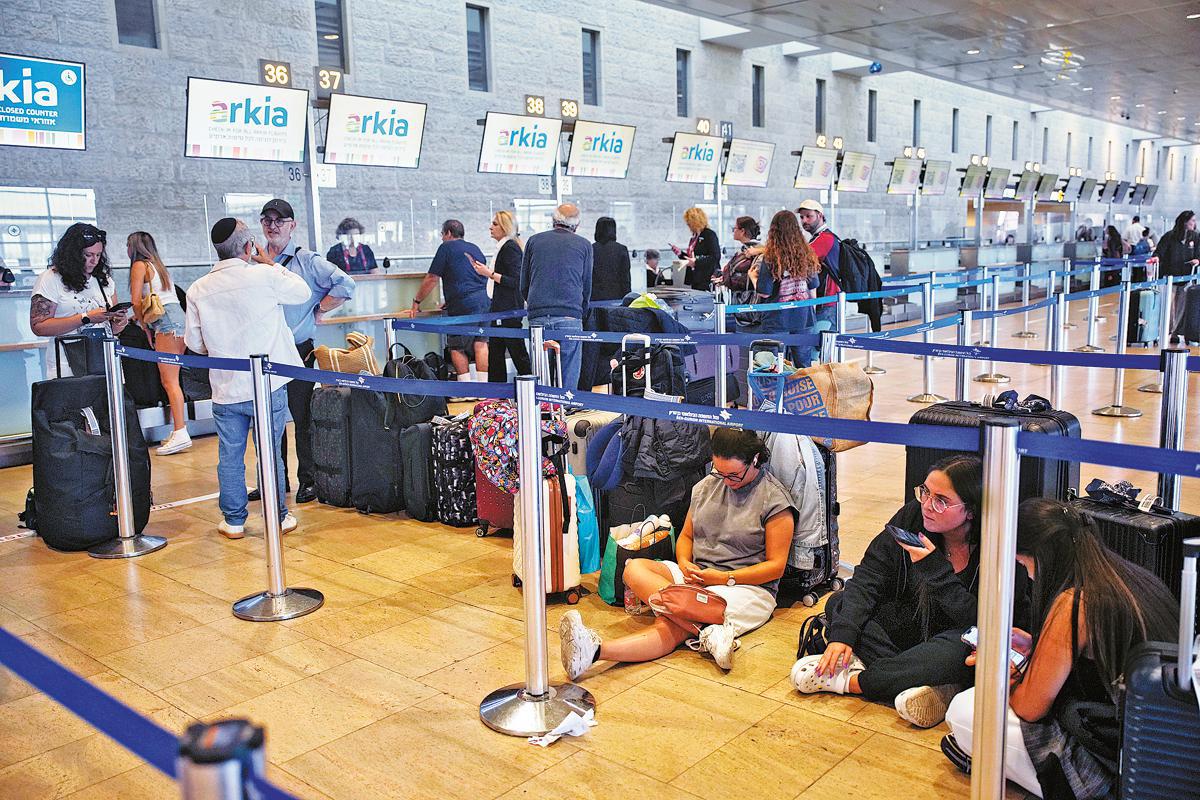
The fragile ceasefire between Israel and Iran stood on Wednesday, with both sides claiming victory in the 12-day conflict despite uncertainty over the damage inflicted by US strikes on nuclear sites in Iran.
United States President Donald Trump, who helped negotiate the ceasefire, said on Wednesday that the truce was "going very well". Trump's special envoy to the Middle East, Steve Witkoff, said earlier that talks with Teheran were "promising" and that Washington was hopeful for a long-term peace deal.
In addition, Trump reiterated on Wednesday that US strikes resulted in the "total obliteration" of Iran's nuclear capabilities, setting the country's nuclear program back by "decades". His administration was countering an initial assessment report issued by the US Defense Intelligence Agency, which said the US B-2 bomber attacks on three key nuclear sites in Iran sealed off entrances to some facilities without destroying underground buildings.
Israeli Prime Minister Benjamin Netanyahu has touted what he described as a "historic victory", as the Israeli military said Iran's nuclear program was set back "by years". He said Israel had removed the "two immediate existential threats" and he was determined to thwart any attempt by Teheran to revive its weapons program.
Iranian President Masoud Pezeshkian said his country had gained a "great victory", and many local residents were celebrating. He said the aggressors failed in their goals of destroying Iran's infrastructure, obliterating its peaceful nuclear energy program and inciting social unrest.
In Teheran, Iranian lawmakers voted on Wednesday in favor of a plan for the government to suspend cooperation with the International Atomic Energy Agency, the United Nations' nuclear watchdog, Iranian state TV said. To take effect, the plan would require final approval by the Supreme National Security Council. Iran has said its enrichment activities are for civilian purposes only.
"The IAEA, which refused even to appear to condemn the attack on Iran's nuclear facilities, has put its international credibility up for sale," Iran's Parliament Speaker Mohammad Bagher Ghalibaf said.
Under the plan, IAEA inspectors would only be allowed to enter Iran with explicit approval from the Supreme National Security Council, and only if the agency guaranteed the security of the country's nuclear facilities, Iran's Nournews reported.
IAEA chief Rafael Grossi said on Wednesday that the UN watchdog's top priority is returning to Iran's nuclear facilities to assess the impact of recent military strikes on Teheran's nuclear program.
Amid growing concerns over potential radiation leaks in Iran following the bombings of three nuclear facilities, the IAEA released a statement on Tuesday in which it said that "some localized radioactive as well as chemical release" has been detected at the damaged sites, although Grossi said that "there has been no report of increased off-site radiation levels".
"During these attacks, we have seen extensive damage at several nuclear sites in Iran, including its uranium conversion and enrichment facilities," Grossi said. However, "there has been no radiological impact to the population or the environment in neighboring countries".
Mahdi Mohammadi, an adviser to Iran's parliament speaker, said Iran had moved its nuclear infrastructure from Fordow. An adviser to Supreme Leader Ayatollah Ali Khamenei was quoted by Iranian media as saying on Tuesday that Iran still had stocks of enriched uranium and "the game is not over".
Sina Azodi, director of the Middle East studies program at George Washington University, told Al Jazeera: "The Israelis have not been able to achieve their objectives in destroying the Iranian nuclear program or forcing Iran to capitulate. Netanyahu may have achieved and can claim some short-term victory, but in the long term, I don't think his leadership serves Israel's interests."
Since June 13, at least 610 Iranian civilians have been killed and more than 4,700 injured, while Iran's retaliatory attacks on Israel have claimed 28 lives, according to official figures.
TEHRAN -- Iran has extended the suspension of all domestic and international flights until Thursday afternoon, the Ministry of Roads and Urban Development said on Wednesday, citing passenger safety concerns following a recent conflict with Israel.
The decision was made "in light of recent developments and to ensure the safety and security of passengers and flights," ministry spokesperson Majid Akhavan said in a statement published on the ministry's website.
Iran closed its airspace on June 13 after Israeli airstrikes targeted Tehran and other locations. The extension of the closure comes despite a US-brokered ceasefire that took effect early Tuesday.
Separately, Alaeddin Rafi'zadeh, head of Iran's Public Administration and Recruitment Organization, said government offices and state-run institutions would resume normal working hours from Saturday, according to the semi-official Fars news agency.
Iran's Foreign Minister Abbas Araghchi criticized the Treaty on the Non-Proliferation of Nuclear Weapons, or NPT, for failing to protect Iran's peaceful nuclear program, saying that Teheran may change its stance on NPT cooperation.
In an interview with Al-Araby Al-Jadeed on Wednesday, Araghchi said Iran has demonstrated its compliance with the NPT, but 20 years of transparency and trust-building regarding its peaceful nuclear program have not yielded positive results.
Iran may change its stance on its nuclear program and NPT cooperation, he said, though the minister noted that he could not predict the direction of this change.
Araghchi added that Iranians have made significant efforts to acquire peaceful nuclear technology, with some scientists losing their lives in pursuit of this goal. No one will stop Iran obtaining this technology, Araghchi said in the interview, according to Al-Araby Al-Jadeed.
US involvement in the Israel-initiated conflict has proven Israeli officials wrong in their belief that Iran would succumb to pressure, as Iran responded forcefully with its third-generation missiles, he said.
Araghchi defended Iran's strategic attacks on US military and intelligence bases in the region as acts of self-defense, saying they should not be seen as violations of neighboring countries' sovereignty. He emphasized that Iran's ties with neighboring states, including Qatar, rest on historical bonds and social interactions.
Iran's Foreign Ministry spokesman Esmaeil Baghaei said the government's position was that the attack had "nothing to do with Qatar", for which Iran has "high respect", but was rather "an exercise of our right of self-defense against American aggression".
The Iranian people have "suffered a lot" from the war but stood firmly against US and Israeli attacks, he told Al Jazeera.
International Atomic Energy Agency Director General Rafael Grossi acknowledged on Wednesday that "no one can deny" Iran has nuclear technology and technical expertise, Mehr News Agency reported.
CUI HAIPEI in Dubai, UAE contributed to this report.
JERUSALEM -- The Israel Atomic Energy Commission (IAEC) said on Wednesday US airstrikes on Iran's Fordow nuclear facility destroyed key infrastructure, rendering the uranium enrichment plant inoperable.
In a statement issued by Israeli Prime Minister Benjamin Netanyahu's Office, the IAEC said Sunday's US strikes, coupled with Israeli attacks on other components of Iran's nuclear program, have set back Iran's ability to develop nuclear weapons by many years.
"The achievement can continue indefinitely if Iran does not get access to nuclear material," the statement read.
At a cabinet meeting earlier on Wednesday, Netanyahu declared victory in the war against Iran, claiming Israel had removed an immediate existential threat.
Israel has defended its strikes as necessary to prevent Iran from acquiring nuclear weapons, an accusation Iran denies.
Also on Wednesday, Iranian Foreign Ministry spokesman Esmail Baghaei confirmed the attacks had caused substantial damage. "Our nuclear installations have been badly damaged, that's for sure," he said during an interview with Al Jazeera.
However, US media, citing a classified intelligence assessment, reported that the damage to Iran's nuclear infrastructure may delay its program by only several months, a finding that contrasts with US President Donald Trump's claim that the facilities were "completely and fully obliterated."
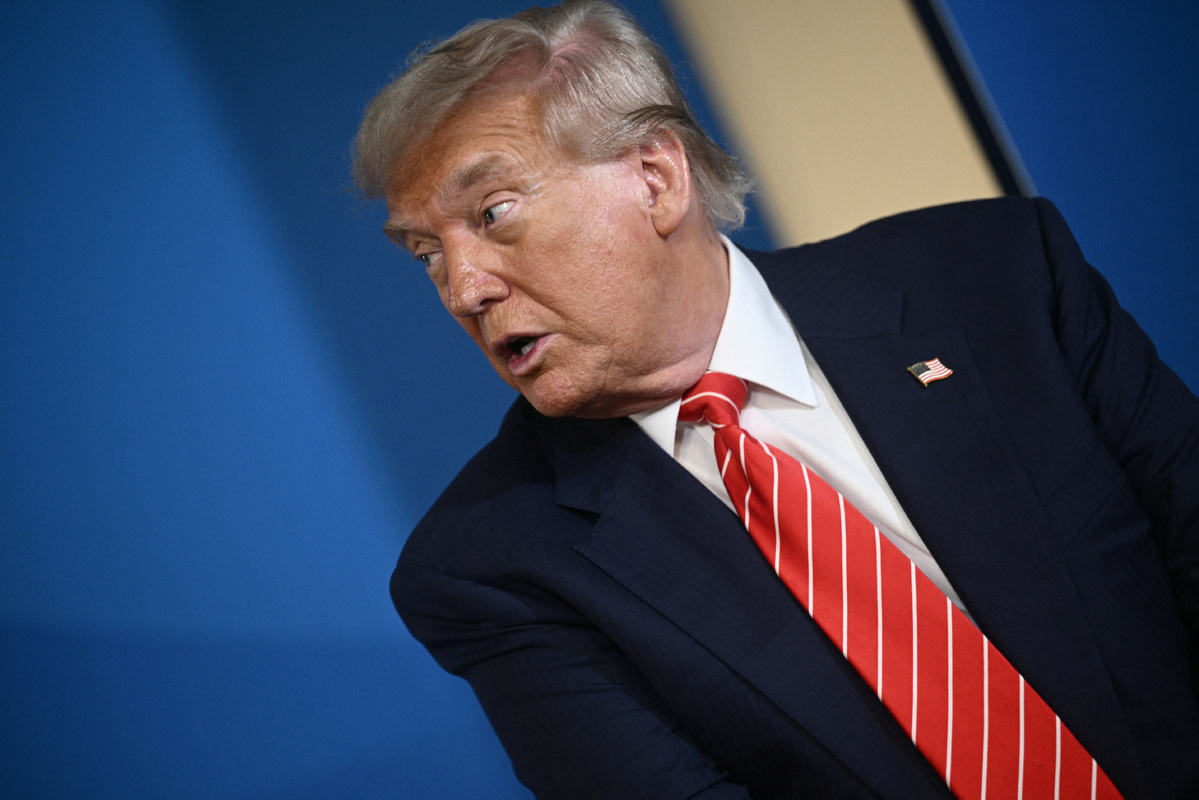
THE HAGUE - US President Donald Trump said on Wednesday that if Iran rebuilds nuclear facilities, the United States will carry out another strike on it.
Trump made the remarks on the sidelines of the NATO summit going on here. Asked if the United States would strike again if Iran rebuilt its nuclear enrichment program, Trump said: "Sure."
Trump also said Washington will not allow Tehran to continue enriching uranium, including using military means.
"We will not let that happen. Number one, militarily. I think we will end up having somewhat of a relationship with Iran," he said.
